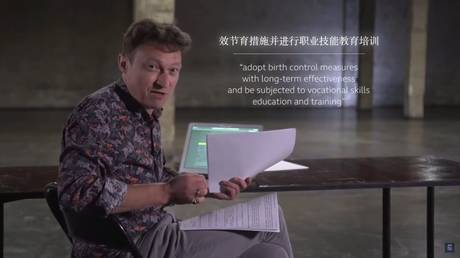
The BBC is deliberately spreading disinformation about China, considering its choice of testimonies when reporting about the country, a spokesperson for the Chinese Foreign Ministry has charged.
The British broadcaster has been giving airtime to “actors & lies” that prove the BBC’s political bias, spokesperson Hua Chunying said in a tweet on Friday.
She was apparently referring to people featured in BBC coverage on the situation in Xinjiang, also called the Uighur Autonomous Region.
Subsequent tweets charged the UK state broadcaster with uncritically citing two sources – Zumrat Dawut and Sayragul Sauytbay – who Beijing calls unreliable witnesses.
Dawut was the subject of a BBC Newsnight episode aired last July, where she claimed she was a victim of forced sterilization at a government detention center and suffered other forms of abuse. China says such centers are used to ‘deradicalize’ Xinjiang’s Uighur Muslim population.
Critics of Beijing allege those sites are actually forced labor camps housing millions and operating as part of a genocidal state policy. According to China, Dawut, who now lives in the US, was never sent to such a facility, had chosen to undergo voluntary tubal ligation, and simply invented other parts of her story.
Sauytbay claims to have been a teacher of the Chinese language at a detention facility where she said she witnessed mass rape, beatings and other mistreatment of female inmates. She now lives in Sweden, which granted her political asylum after deciding that sending her back to China would threaten her life.
Beijing says she is a former kindergarten head who never worked at a detention center, and that she fled the country after allegedly defrauding a bank by taking a loan to supposedly purchase a house, instead sending the money to a relative in Kazakhstan.
Conflicting claims about the veracity of witnesses talking about the situation in Xinjiang are nothing new, and have been an integral part of the rhetorical war that escalated under former president Donald Trump between the US, its allies and China.
As the confrontation became more intense over the past years, people with apparent anti-Chinese bias became increasingly accepted by Western media. An example would be Adrian Zenz, a widely-cited China researcher, who considers himself to be on a mission from God against the Chinese government.
The BBC’s willingness to accept such testimonies on face value was noted by several Chinese diplomats this week. Dawut’s story was mentioned on Thursday by Wang Wenbin, another Foreign Ministry spokesperson, who said she “has become an actor and a tool for anti-China forces” and that the BBC was spreading “badmouthing disinformation” about Xinjiang.
Beijing’s already frosty relationship with London was dealt a blow this week after the British media regulator Ofcom rescinded the broadcasting license of China’s CGTN broadcast outlet. Ofcom said CGTN was under the editorial control of the Chinese Communist Party, and thus cannot show its content in the UK. Beijing countered by saying that CGTN was complying with British law and ethical norms, calling the ban “political suppression”.
The Foreign Ministry then accused the BBC of biased reporting about China and spreading “fake news” about the country for political reasons. The publicly funded British broadcaster denied the accusation.
Like this story? Share it with a friend!




